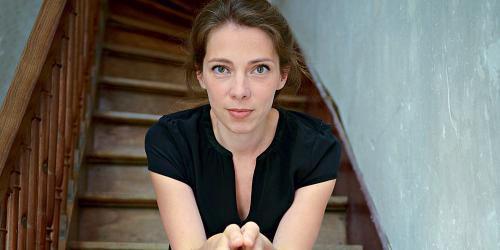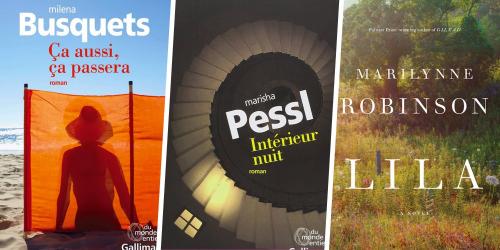That was four years ago. End August 2011 came out "Nothing is opposed to the night", which was going to know an extraordinary destiny. That autumn, Delphine de Vigan's book, with her sublime jacket, was on every mouth and in every hand. The story of a mother, her own, beautiful and fantastic, gradually falling into delirium and madness before her two daughters left to their own devices. At the media flood, the incessant tours, here and abroad, succeeded a film, forgettable, then silence, or almost. The novelist had gone away to write. "According to a true story", his new "novel", will not disappoint all those who praised the precedent. Here, under the auspices of Stephen King, the book tells the progressive psychic possession of a novelist named Delphine by a new "friend", L., which takes him far, far away, "until bottom of the hole " ... A narrative as fascinating as it is anxious, impossible to let go, stuffed with traps, convincing tracks ... Autofiction? Fiction? Between the two ? It does not matter. After all, a novel is never a lie that tells the truth.
MC: In what state do you feel, on the eve of the release of your new book, four years after the success of "Nothing is opposed to the night"? Relaxed, anxious?
Delphine de Vigan: Fairly anxious. I think it's the fear of disappointing.
Have not you been afraid not to regain your inspiration?
If, I was afraid that this book was the last. It is a fear that I feel after each book, but this time it was multiplied. Many readers asked me your question. It contained the idea that I had come to the end of something, a cycle or a period, and perhaps that was the case. It seemed to me to contain, too, the threat of an end to the journey. But it was probably a projection on my part.
How was the idea of this book born?
He imposed himself on me. One day I woke up and he was there. Whether inspired or not by actual facts, I tend to believe that books are fossils buried in the earth and that we have to dig up, as Delphine writes, the character of the book. The passage to the act of writing, this moment when one decides to go there, remains for me rather mysterious.
The looks of our parents, other adults, other children are tattooed on our skins. We had to deal with it. And sometimes without.
The idea of the friendly intrusion, initially peaceful then quickly agonizing, is here very central ...
Friendship is for me an inexhaustible source of joy, tenderness and comfort. But I believe that we have all observed, or known, a relationship like this - fusional, exclusive - where one of the two takes power over the other. A friendship that turns into a dangerous bond, in a relationship of grip.
When you write: "I like in the Other (and in women often) this capacity to evoke the intimate without being immodest" , does this mean that friendship is played at this essential level according to you ?
No, not necessarily friendship. I notice that even without being friends, women often have the ability to talk about themselves, to evoke their sensations, their feelings. To come into contact, even in an ephemeral way. This will not stay on the surface.
But precisely ... an author is a bit, because of his position, the dream target of predators and manipulators, right?
No more than anyone! I would tend to think that predators and manipulators are attracted to those who are able to resist them. Otherwise, there is no game. If the prey is KO in the first round, it has no interest. In this a writer can be an interesting prey.
L., has the terrifying woman who tries to take possession of you, of your work, partly existed?
That is the whole question of the book. (Smile.) Every reader will get his idea.
A question often comes up in your book: can we continue to write fiction at the time of the triumph of TV series?
The series set the bar very, very high in fiction. They are the perpetuators of the nineteenth century serial novel, the ancestral tradition of the narrative. They invent characters to which one attaches themselves in a desperate way, create cities, worlds, unfold to infinity. But I find it very stimulating. For me, it is out of the question to abandon the territory of fiction to the writers!
But the title, "According to a true story", is it a nod to the ambiguity that may have caused the name "romance" on your previous work?
I do not think there is any ambiguity in that name. "Nothing is opposed to the night" is a novel, I have often explained it, although it is largely inspired by the story of my mother. This book was a tribute, a declaration of love. I sincerely believe in this phrase of Jules Renard: "As soon as a truth exceeds five lines, it is of the novel." From the moment that we organize, select, construct a narrative, with a point of view, ellipses, unspoken, details, hypotheses ... we are in fiction.

You describe your state during and after the enormous success of your previous book: "naked in the middle of the road" . At this point dispossessed of yourself and delivered into grazing?
Again, it is the character who speaks. But yes, of course, that was the risk - and, as far as I was concerned, I knew it. "Delivered in pasture" : I would not use these words. I would say "vulnerable". But this is true for my other books: writing is always a form of exposure, exposing it. A kind of leap into the void. And I'm never quite sure I'll fall back on my feet.
One sentence seems to be essential for you to understand: "We all bear the trace of the gaze that came upon us when we were children or adolescents ... A look of hatred and mistrust". Is this always what you feel?
Yes, I think so deeply. I did not invent anything, and others said it better than me. The gaze of our parents, that of other adults, of other children, all those looks that have hatched us, worn, soiled, wounded, tattooed on our skins. We had to deal with it. And sometimes without. For L., it is a look that devalues, which destroys. But it has rebuilt itself.
You ask yourself, at one point: what kind of women do you choose to be, if you have a choice?
Do we choose to be natural or rather sophisticated, to devote twenty minutes or two hours a day to his appearance, to dress in such and such a way, to rise or hide? Or is this all the reflection of the complex relationship we have with our body, our own image? It seems to me that as we grow older, we age, this relationship changes, and we choose more what kind of woman we want to be.
You say, however, "the desire to be another, more beautiful, more spiritual, more confident, to be someone else in short ..."
Like the narrator, I spent a lot of time dreaming of being someone else (there is a beautiful song from the Great Sophia on this theme). But it seems to me, over time, that I have more or less accommodated myself. And today, I'm not sure I would trade, even against a more attractive model!
Writing is for me an entrenched territory. But it is also what makes it so dangerous. And maybe one day I will not have the strength to write.
There is a certainty in your books to touch so many people. I was wondering where you put it ...
It's not for me to say. But it is true that the readers send me this idea of rightness. That is probably what affects them. And that's what I'm trying to do: put words on what each of us feels or feel, describe as closely as possible what happens in such and such a circumstance. What a woman feels when her children leave home, for example. But often I realize that sensation interests me even more than feeling.
Some of your readers probably expected you to go even further in the confession, that you were definitely leaving the domain of romance ...
No, I do not believe it, even if our age is fascinated by the true. It is this fascination that is at stake in reality television, in films inspired by real facts, it is this fascination that summons these hordes of witnesses and guinea pigs in television programs. But I think that literature is played elsewhere ... Most readers are able to read a fiction, to adhere fully to it, that is to believe in a story while knowing that it is invented. There is something magical about this adventure, and it is the opposite of imposture.
When you say to L., "You are the product of shame, pain, secrecy, collapse," is this, basically, what you think? As if you were programmed to speak on their behalf?
Yes. You know, writing has something to do with the child we were, that look that was laid on us or that we missed. Writing is for me an entrenched territory. But it is also what makes it so dangerous. And maybe one day I will not have the strength to write.
What interests you above all, is to understand what we are constituted. By what operation we manage to assimilate certain events, certain memories. Is it the heart of the heart of your reason to write?
Delphine says something like that in the book. (Laughter.) Yes, that's pretty much what I'm looking for.
Have you learned much about yourself by writing about your mother? And what, in particular?
I understood in part why I was writing. Where was to me the origin of the writing.
Without revealing your book, there is an anguishing, terrifying ghost, which is never very far ... it is yourself.
Yes, it's true. But is not everyone?


